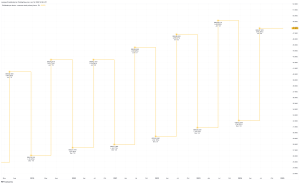Will these FTSE-listed stocks be among the biggest winners during the next upturn? These five Fools are confident!
AstraZeneca
What it does: AstraZeneca is a global biopharmaceutical company specialising in oncology, rare diseases, cardiovascular, and other areas.
By Ben McPoland. AstraZeneca (LSE: AZN) is the largest company on the London Stock Exchange with a massive £191bn market cap. Whenever a new bull market gets going, I reckon the pharma firm’s size could help drive a fair bit of it.
The company is aiming to grow its revenue to $80bn between now and 2030. That would represent 75% growth, which would be impressive for an already giant business. It’s also investing in “disruptive innovation that will shape the future of medicine and drive long-term growth”.
As part of this, it recently acquired biotech Fusion Pharmaceuticals for up to $2.4bn, as well as Gracell Biotechnologies, a pioneer in CAR-T cell therapies. It’s also licensed an experimental pill from China’s Eccogene to try and break into the booming anti-obesity drug market.
Investors tend to get more bullish about innovative growth stories like this during bull markets.
Having said that, litigation is an ever-present risk in the industry, as are patent expirations, regulatory changes, and inevitable clinical trial disappointments. Still, I reckon AstraZeneca has what it takes to continue outperforming the UK market over time.
Ben McPoland owns shares in AstraZeneca.
Burberry
What is does: Burberry is a British luxury brand with 229 retail stores across the globe.
By Andrew Mackie. One sector I fully expect to be at the forefront of outsized gains in the next bull market, is luxury retail. But for now, the industry is very much being buffeted from multiple angles. Burberry (LSE:BRBY) has been by far its worst performer. Its share price has collapsed by over 70% in just 15 months.
Its strategy of positioning itself as the Modern British Luxury brand has not delivered. Despite stating in its recent trading update that its strategy won’t change, I fully expect that the new CEO will quickly depart from decisions made by his predecessor.
The extent of its share price decline has taken me by surprise. But a company that has been around for as long as Burberry has, is not always going to get everything right.
The luxury market customer base continues to expand across generations and geographies. I fully expect it to provide growth and durability well into the future. I view its share price weakness as a wonderful opportunity. Indeed, the more it falls, the more shares I intend to buy.
Andrew Mackie owns shares in Burberry.
ITV
What it does: ITV is a television network owner and TV content creator
By Alan Oscroft. Investors have been pivoting away from big tech stocks, inflation is falling, and central banks are looking likelier to cut interest rates by the day.
To me, that says one thing. Investors should, with a bit of luck, come flocking back to some of the stocks they’ve shunned in the past few years. And I think ITV (LSE: ITV) might be one of them.
The ITV share price has been picking up this year, but it’s still way down since before the 2020 crash. And I just don’t think its valuation reflects its potential.
Competition has to be the biggest risk, and I fear that investor caution could weigh on the share price for a while. And priced at 14 times earnings, the shares don’t look super cheap.
But that could drop to under 10 on 2026 forecasts. And strongly rising cash flow should keep the dividend growing, from the 6% on the cards for 2024.
Alan Oscroft has no position in ITV.
Oxford Biomedica
What it does: A gene and cell therapy company specialising in the development of gene-based medicines.
By Mark David Hartley. Oxford Biomedica (LSE: OXB) is a world-class pioneer in cell and gene therapy, providing services to the pharmaceutical and biotechnology industries. It specialises in developing therapies and treatments for chronic and deadly viruses like HIV.
Despite its groundbreaking developments, it’s not yet profitable. Its FY 2023 results revealed a loss of £1.63 per share, with a net loss of £157m and revenue down 36%. Like many young tech companies, it’s been spending a lot on R&D, resulting in losses. Whether that gamble pays off remains to be seen.
While the share price is down 22% over 12 months, it’s improved lately, rising 51% in Q2 this year.
Based on future cash flow estimates, some analysts consider it undervalued by 70% and believe the company will become profitable in 2026. With an increasing demand for biomedical advancements, I agree and think it’ll take off in the next few years.
Mark Hartley owns shares in Oxford Biomedica
Scottish Mortgage Investment Trust
What it does: Scottish Mortgage is a Baillie Gifford fund that aims to “own the world’s most exceptional public and private growth companies”.
[fool_chart_ticker =LSE:SMT]
By Charlie Keough. One stock I see leading the next bull market charge is Scottish Mortgage Investment Trust (LSE: SMT).
It owns some of the most exciting growth companies in the world, such as Elon Musk’s SpaceX. These companies suffer in high interest rate environments, so the trust has struggled over the last few years.
But with cuts just around the corner, investor sentiment should turn more bullish on these sorts of companies. Falling rates are ideal for the disruptive businesses Scottish Mortgage owns because it means lower borrowing costs.
The risk with investing in the trust is that its share price can be volatile, giving its large weighting to growth stocks. What’s more, around a quarter of its holdings are private companies. Pinpointing the value of these businesses can be difficult.
However, we saw just what the stock could do when it rose by over 100% during 2020. And it’s 41.9% off the all-time high it hit in 2021. As such, it’s currently trading at a 9% discount to its net asset value.
Of course, past performance is no indication of future returns. But I’m still optimistic, despite climbing 10.6% year to date, we could see Scottish Mortgage rise further in the months and years ahead.
Charlie Keough owns shares in Scottish Mortgage.
This post was originally published on Motley Fool







